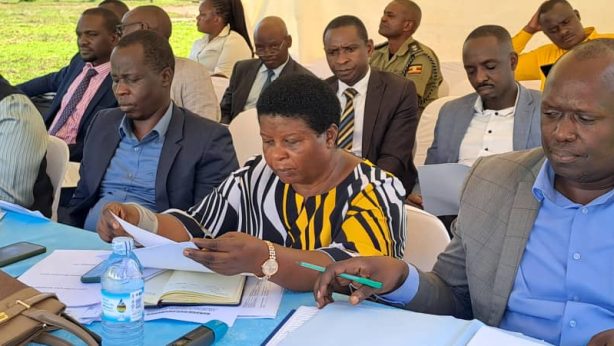Sauti za Wananchi at 10: Celebrating a Decade of Citizen Voices Shaping Policy
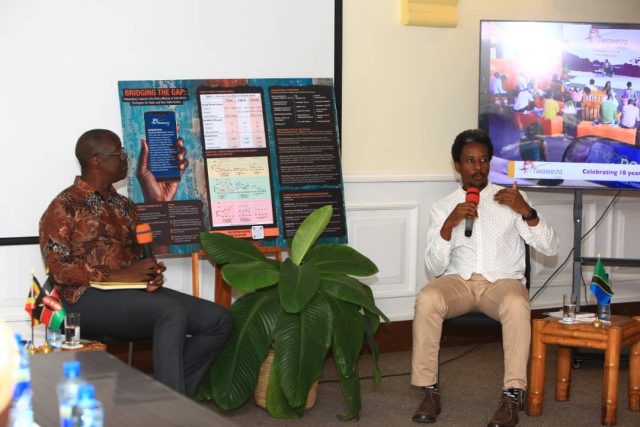
Twaweza recently celebrated a significant milestone—ten years of Sauti za Wananchi (Citizens’ Voices). We launched a compendium of highlights from this period to mark the anniversary.
This innovative initiative has been at the forefront of gathering and amplifying citizens’ opinions and experiences across Tanzania, Kenya, and Uganda. As we reflected on a decade of insights, a hybrid regional launch event held concurrently in Dar es Salaam, Nairobi, and Kampala brought together policymakers, civil society leaders, and engaged citizens to explore the changing landscape of East African public opinion and its implications for governance and development.
How it started
Established in Tanzania in 2013 and later expanded to Kenya (2015) and Uganda (2017), Sauti za Wananchi has revolutionised how we understand public opinion in East Africa. Using mobile phone surveys with nationally representative panels, the initiative has conducted over 126 survey rounds, amassing an impressive 74,000 hours of interviews. These surveys have covered various topics, from education and health to governance and livelihoods, providing a comprehensive picture of citizens’ concerns and aspirations.
One of the most encouraging aspects of the compendium was the evidence of Sauti za Wananchi’s impact on policy and practice. Several examples stood out:
- In Tanzania, data on citizens’ views about a new mobile money transaction tax contributed to public debate and ultimately led to the tax being substantially revised.
- During the COVID-19 pandemic, Sauti za Wananchi data-informed health messaging and vaccine uptake strategies in Uganda and Kenya.
- In Kenya, findings on security prompted the Independent Policing Oversight Authority (IPOA) to seek a partnership with Sauti za Wananchi, enabling them better to understand citizens’ concerns about policing and security.
- The integration of citizen-generated data into national statistics. In Kenya, the Kenya National Bureau of Statistics (KNBS) has incorporated data from Sauti za Wananchi into its official reports, allowing for more accurate tracking of Sustainable Development Goals (SDGs). This sets a precedent for how citizen data can complement traditional data collection methods to create a fuller picture of national progress.
These examples demonstrate the potential for citizen-generated data to influence policy decisions and improve governance. However, as several participants noted during the discussion, translating data into sustained policy change remains challenging.
The core mission of Sauti za Wananchi is simple yet powerful: to ensure that citizens’ voices are heard in policy discussions and decision-making processes. In opening remarks, Aidan Eyakuze, Executive Director of Twaweza, noted, “Governments exist to serve citizens and are ultimately accountable to them. Yet, too often, citizens are sidelined from the work of government. Sauti za Wananchi aims to bridge this gap.”
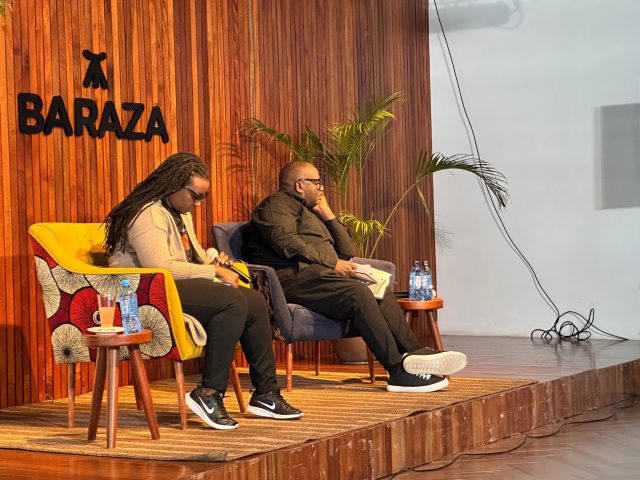
The Compendium Launch Event: A Truly East African Affair
The launch event was a testament to Sauti za Wananchi’s regional nature, with simultaneous events held in Tanzanian offices, Kenya at Baraza Media Lab, and Uganda at Media Challenge Lab. In an innovative hybrid format, the event connected live audiences in Tanzania, Kenya, and Uganda, bridging geographical distances to create a unified space for discussion and reflection.
The audience reflected Sauti za Wananchi’s broad impact, including representatives from civil society organisations, media outlets, government agencies, donor organisations, and academic institutions. This diverse gathering underscored the wide-ranging influence of citizen voice data on various sectors of East African society.
The event featured a main presentation by Aidan Eyakuze, followed by a panel discussion with distinguished speakers: Charles Obbo (journalist and author), Christine Mungai (writer and journalist), Sammy Awami (journalist and media consultant), and Charles Mwanguhya (journalist).
Key Insights: A Decade of Citizens’ Voices
Aidan Eyakuze’s presentation of key findings revealed several critical insights into the lives and opinions of East African citizens. The data covered three main areas: livelihoods, public services, and governance.
- Livelihoods and Economic Concerns
Across all three countries, inflation and the rising cost of living emerged as the top concerns for citizens. However, the data also revealed interesting differences in how people make a living. In Uganda, for instance, agriculture remains the dominant source of income for 69% of households, while in Kenya, casual work (37%) has become the primary income source for many. Tanzania stands out, with 38% being self-employed or running businesses compared to Kenya and Uganda, but like Uganda, agriculture, at 39%, remains the dominant primary source of income.
Food insecurity emerged as a persistent challenge, with significant spikes during crises like the 2016-2017 drought and the COVID-19 pandemic. Despite these challenges, the data showed remarkable optimism among citizens about their economic futures, even when current conditions were difficult.
- Public Services Under Pressure
The compendium highlighted trends in the use of public services. There’s been a decline in public health facilities across the region, with many citizens turning to private or NGO-run facilities instead. Health insurance coverage remains low, particularly in Uganda, where only 2-3% of citizens report having coverage, and a stark contrast to Kenya and Tanzania, where health insurance coverage is higher. A worrying trend, however, is the shrinking use of public health services, particularly in Kenya, where less than half of citizens now seek care at government facilities.
Access to clean water continues to be challenging, especially in rural areas. Tanzania, in particular, lags behind Kenya and Uganda in rural water access, with citizens in rural regions having to walk significantly farther, though it is catching up. Citizens across the region report significant challenges in accessing clean drinking water, with distance to water points and insufficient water points being the main issues.
- Governance and Civic Engagement
Citizens’ views on their countries’ overall direction have fluctuated over the decade, often reflecting political changes and economic conditions. Interestingly, the data revealed varying levels of civic participation across the three countries. In Tanzania, 75% of citizens reported attending community meetings the previous year, compared to 56% in Kenya and 40% in Uganda.
Another striking insight from the compendium is Kenya’s lack of a strong civic identity. Only one-quarter of Kenyans identify as Kenyans first, a figure much lower than in Tanzania and Uganda. This lack of identification with the nation raises questions about the broader social contract between citizens and their government. In contrast, Tanzanians exhibit a stronger sense of civic pride, often identifying first as Tanzanians and placing greater trust in their government.
Media consumption patterns also differed, with radio dominating in Uganda and Tanzania, while television is the primary news source in Kenya. Social media has become an increasingly important information source, especially in Kenya.
The compendium also highlights attitudes towards regional integration and refugees. While there’s strong support for providing essential services to refugees across all three countries, divergent views exist on offering economic opportunities and pathways to citizenship.
Panel Insights: Interpreting the Data
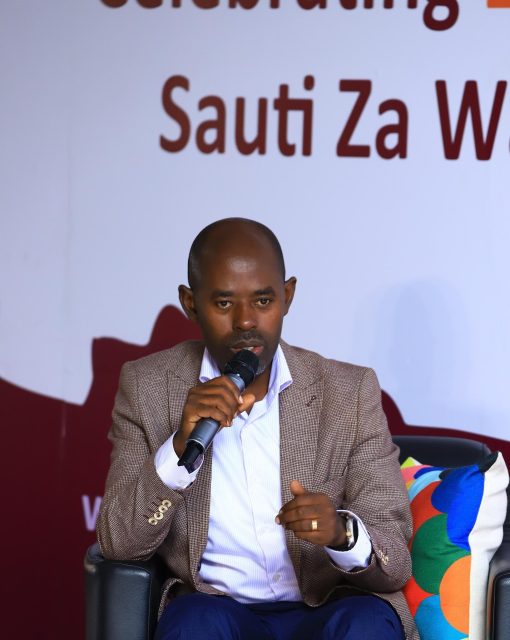
The rich discussion among the panellists, moderated by Aidan Eyakuze, brought together diverse voices. It brought the data to life, highlighting shared challenges and unique national contexts. It underscored the value of the Sauti za Wananchi initiative in providing a foundation for informed dialogue and policy-making across East Africa.
Economic Resilience and Optimism: One of the most striking issues to emerge was the apparent contradiction between current economic hardships and the high levels of optimism reported by citizens across all three countries. Christine Mungai pointed out that this optimism might be rooted in cultural and religious factors. She noted, “There’s a strong belief in personal breakthroughs in Kenya. Our optimism is often fuelled by religious faith, which gives hope for a better tomorrow despite current struggles.”
Charles Mwanguhya added an interesting perspective, linking this optimism to the emphasis on hard work revealed in the Ugandan data. “The high value placed on hard work by Ugandans might explain their optimism. There’s a belief that one can overcome difficulties through hard work.” Focusing on the link between governance and economic realities. He pointed out that while Ugandans rely heavily on agriculture, a worrying lack of financial safety nets, such as savings or insurance, exposes many citizens to economic shocks. The panel agreed that although citizens are hopeful, the disconnect between governance and citizen expectations remains a significant challenge.
Shifting Economic Landscapes: The discussion highlighted significant shifts in the economic structures of the three countries. Sammy Awami emphasised the rise of entrepreneurship and small businesses. “What we’re seeing in Tanzania is a surge in small-scale entrepreneurship. Citizens are creating opportunities in the face of limited formal employment,” he observed.
This contrasted with Uganda’s continued reliance on agriculture, as pointed out by Charles Mwanguhya. He expressed concern about the sustainability of this model, noting, “While agriculture remains our backbone, we need to consider diversification and value addition to create more opportunities and increase incomes.”
Governance and Citizen Engagement: A critical theme emerged: the relationship between citizens and their governments. Charles Obbo highlighted a concerning trend of citizens withdrawing from engagement with public services. “The data shows a decline in the use of public health facilities and other government services. This could signal an erosion of trust in public institutions,” he warned.
Christine Mungai added to this, pointing out the low levels of civic identity in Kenya. “Only a quarter of Kenyans identify primarily as Kenyan. This has implications for national cohesion and citizen participation in governance,” she noted.
Regional Integration and Identity: The discussion also touched on the potential for regional integration. Sammy Awami pointed out, “Despite our differences, our challenges have many commonalities. This data could be a starting point for more coordinated regional approaches to development.”
Charles Obbo added an interesting perspective on cultural integration: “The popularity of East African music and entertainment across our borders shows that cultural integration is already happening at the grassroots level. Policies might need to catch up with the people.”
Youth and Future Prospects: The panellists agreed that the data revealed critical issues regarding youth aspirations and challenges. Christine Mungai emphasised, “Our young population might drive the high levels of optimism we see, Gen Z. They’re innovating, creating new economic opportunities, particularly in the digital space.”
Across all three countries, youth unemployment is a significant concern, with many young people turning to the informal sector for work. In Kenya, the survey highlights the prevalence of casual work as the largest source of income for many households, while agriculture remains the dominant source of income in Uganda.
Charles Mwanguhya, however, cautioned about the need for supportive policies. “While our youth are optimistic and hardworking, we need policies that create real opportunities for them, particularly in education and skills development,” he stated.
Gender Disparities: The discussion also highlighted persistent gender disparities across various indicators. The audience members noted, “We see lower participation of women in community meetings in Kenya and Uganda and the challenges they face regarding water issues. This raises questions about women’s voices in decision-making processes.”
Christine Mungai added, “The gender gap in access to financial services, particularly in Uganda, is concerning. We need to understand the barriers women face and address them systematically.”
Climate Change and Food Security: The discussion touched on emerging challenges, particularly climate change and its impact on food security. Charles Mwanguhya highlighted this as a critical issue for Uganda: “Our reliance on agriculture makes us particularly vulnerable to climate change. We’re seeing this reflected in the data on food stress.”
Sammy Awami added a regional perspective: “Climate change doesn’t respect borders. This is an area where regional cooperation is not just beneficial but necessary.”
Language as a Unifying Factor: An intriguing theme during the plenary discussion was the role of language, particularly Swahili, as a potential unifying factor across East Africa. Sammy highlighted Swahili’s importance in Tanzania’s national identity, noting its role as a source of pride and unity. Christine Mungai added that despite English’s dominance in formal sectors in Kenya, there’s a resurgence of interest in Swahili, especially among youth. Charles Mwanguhya provided a contrasting view from Uganda, where English still dominates, but there’s growing recognition of Swahili’s potential in facilitating regional integration.
Charles Obbo emphasised that seriously considering Swahili could be a powerful tool for bringing East African people together. However, the discussion also touched on the challenges of a shared language, with Mungai noting the need to balance regional goals with respect for local linguistic diversity. Sammy added an economic perspective, suggesting that promoting Swahili could facilitate regional trade and cultural exchange.
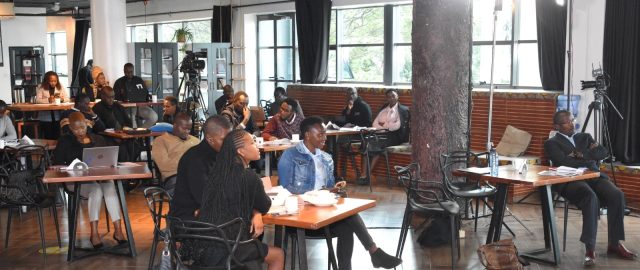
Looking ahead
As Sauti za Wananchi enters its second decade, Twaweza East Africa aims to expand the platform’s reach and impact. The focus will remain on ensuring that citizen voices continue to inform policy decisions at both national and regional levels.
Launching the Sauti za Wananchi 10-year compendium is a call to action, not just a celebration of past achievements. As citizens, policymakers, researchers, and civil society actors, we all have a role in ensuring that these voices inform the decisions that shape our societies.
We invite you to explore the compendium and engage with the data. Whether you’re a journalist looking for story ideas, a policymaker seeking to understand your constituents, or a concerned citizen, a wealth of insights is waiting to be discovered. Twaweza will organise activities and engagement events in the coming months to dive deeper into specific themes from the compendium. Stay tuned to our social media channels for announcements.
As we conclude this reflection on 10 years of Sauti za Wananchi, it’s worth remembering the core principle that has driven this initiative from the start:
“Every citizen’s voice matters. By listening to these voices, understanding their concerns, and acting on their insights, we can build more responsive, accountable, and effective governance across East Africa.”
As Sauti za Wananchi looks ahead to the next decade, its mission remains clear: to ensure that citizens’ voices, whether from rural villages or bustling urban centres, continue to shape the policies that govern their lives. As long as these voices are heard, East Africa’s future looks bright. Here’s to another decade of amplifying citizens’ voices and bridging the gap between the governed and those who govern. Sauti za Wananchi’s journey continues, and we invite you to be part of it.

